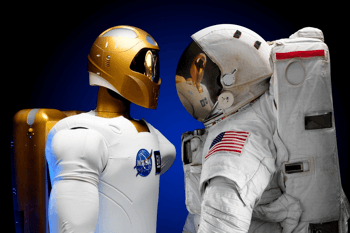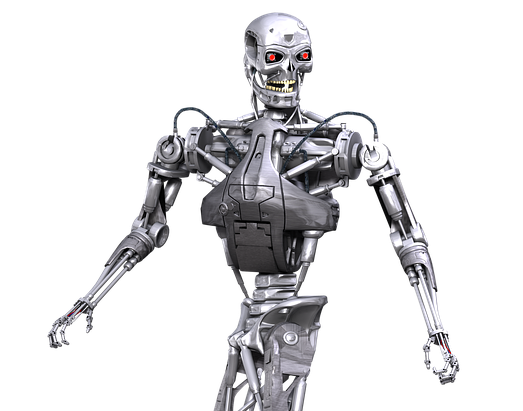
Artificial intelligence is quite popular nowadays because of the benefits it can provide to all types of businesses. AI products we can use in Insurance, Healthcare, Genetics, Agriculture Industry, Road Traffic Management and other areas that are based on data. There is a tendendancy that companies are trying to remove human personnel from routine work and replace them with the software created using Artificial Intelligence and Machine Learning. And it’s not surprising – such a replacement usually leads to service quality improvement, the reduction of time needed for typical routine operations, reduced probability of making a mistake by an ordinary employee and other benefits.
Sounds fantastic, right? But why do most companies still bypass Artificial Intelligence integration in 2021? Let’s dig deeper to find the answer.
Many companies often pay attention on the following issues, attributed to Artificial Intelligence:
- Data Security Issues
- Data Privacy Concern
- Mass Unemployment due to AI Integration
- Unbiasedness of AI
- The Impossibility of Total Human Control
- AI-based solutions are still too expensive for the majority of companies
But are these real AI problems or just prejudices? And if they are problems – is there a chance to overcome these 5 AI concerns by 2021? Let’s find out.
USER DATA CANNOT BE SECURED IN A PROPER WAY FROM AI
Machine Learning and Artificial Intelligence process huge amounts of data. More importantly, it is usually personal data of real people. We often hear about personal data leaks from huge companies such as Apple, Amazon, and Facebook, and it’s not a secret that they use Machine Learning algorithms for personal data processing. Here comes the logical concern – are these two things related and can the usage of AI and ML increase the probability of data leaks?
The true fact is that we haven’t ever heard about data leaks or data theft by AI. Such a situation is absolute nonsense. An industrial AI-based program help to solve a definitive problem and nothing else. And we must admit, it perfectly copes with its task.

Today’s industrial Artificial Intelligence doesn’t possess “an independent mind” – it just can’t make decisions beyond its program
Highly qualified developers design and properly secure all modern top-level AI innovation products. If intruder hacked the software (which is merely possible), it is still very hard to understand the code because of its complexity. Moreover, all data processed by AI or neural networks cannot be decrypted.
The next argument is that almost every AI system based on the neural network uses popular open-source frameworks and libraries like TensorFlow, Microsoft CNTK, Theano, Caffe, Keras, Torch and etc. Huge companies like Google, Facebook, and Microsoft support the majority of them. These companies publish frameworks and libraries they develop under fully open-source policies, so every developer may ensure privacy and do penetration tests.
It would probably surprise you that the real threat to data security comes from the people themselves! 4 of 5 causes of data breach are because of human error, as the Information Commissioner’s Office reports. Human mistakes vary from using weak passwords to forgetting confidential documents in a public place.
All that taken together proves that data security problems related to artificial intelligence are not legitimate concerns – they are myths. The number of data leaks would drastically decrease if companies pay more attention to teaching their personnel the basic rules of data management.
ARTIFICIAL INTELLIGENCE INFRINGES USER CONFIDENTIALITY
Another issue relates to user data privacy, as the majority of AI applications work with private user data.
In general, people dislike the idea that their data is analysed, and that they are divided into different groups, that are formed to target people better. After all, each person is a unique being. Though, for a long time companies have used personal data to calculate the probabilities of the events. For this, user data is first depersonalized prior to building mathematical models. Often such calculations take place in finance, insurance and other industries.

But with the rise of intelligent software, these fears become more serious:
– “What if AI knows everything about me, even the facts I don’t want it to know?”
These fears are way too overblown and far-fetched. All user data is depersonalized to the very possible extent. The same as way as for statistical analysis.
AI by itself does not violate any personal data policies. It depends on sample data that people use for training. The only difference is that in the past people manually mined insights from personal data, and now we can do it by AI-based solutions. So it’s still a human who affects whether privacy has been violated or not.
But applying Artificial Intelligence for data processing brings in new benefits that no other technology could provide with. AI is known to reveal unobvious insights, which can lead to the company’s either profit or loss. Also, it allows for optimizing and speeding up the process that has already been debugged.
We are sure to say that the concern of user data privacy will remain paramount in future. Nowadays several huge companies related to AI development are engaged in creating regulating documentation to establish how personal data may be used.
AI INTEGRATION POSES A THREAT OF ENDEMIC UNEMPLOYMENT
Today, AI and neural networks are well used for making sound decisions based on data. Does this mean that we are about to stop making business decisions on our own? Would managers be displaced by the software, which is more quick to process enormous quantities of information and suggest the most optimal decision?
Let’s turn back to the history.
50 years ago a typical financial company needed several dozens of employees to calculate stock quotes manually. After the computer revolution, the world changed once and for all, and one powerful computer equals the whole department. Have the computer substituted personnel?
Also, note that every company want to hire loyal and skillful personnel. It has no sense to dismiss a qualified employee. We could re-educate it for another work for the same company.
By 2021, AI will generate 2.3 million jobs, exceeding the 1.8 million that it will remove, research firm Gartner said in a report.

AI can take on people’s dirty, dangerous and dull jobs.
In turn, it will lead to creation of other jobs
Therefore, one shouldn’t consider AI as the cause of unemployment. In the near future, Artificial Intelligence adoption will free up professionals for other, more creative tasks taking over tedious work.
AI IS TOO UNBIASED FOR EVERYDAY USE
Even the most smart AI-powered programs and robots can make mistakes that no one people would make. For example, a year ago a Todai robot tried to pass an entrance exam for Tokyo university. And even though the robot’s results have surpassed as much as 80% of the students’, it failed at some questions whose answer would have been obvious even to young children.
Let’s look closer on how police departments use Artificial Intelligence solutions. In some cities video surveillance systems help to predict crimes until it is too late. AI reveals behavior patterns and tries to detect dangerous items like guns, or stolen vehicles. Unfortunately, AI can’t see the difference between a toy and a real gun. Also, it is difficult for AI to tell a kid playing with a gun-like toy from a real criminal.
In that situation AI is too unbiased and is theoretically correct. So any gun we can interpret as a dangerous signal. The main problem here is that Artificial Intelligence doesn’t understand many other factors that we didn’t code yet. Life is a little bit more complicated and we can’t analyze quickly.

A VIDEO SURVEILLANCE PROGRAM: WE STILL NEED A HUMAN OPERATOR TO APPROVE OF ARTIFICIAL INTELLIGENCE DECISIONS
Similar situations may appear in every industry – from security to insurance. It turns out that the error of Artificial Intelligence in relation to a person can lead to catastrophic consequences both for a single person and for a company.
The conclusion is that today’s we deprived AI of irrational thinking. It can only absorb large (enormous) numbers of information and facts, but it can comprehend it like humans. So far, Artificial Intelligence is not ready for totally automatically usage. So we need human control to check its performance and the final decision should always rest with a human.
ARTIFICIAL INTELLIGENCE CAN GO OUT OF HUMAN CONTROL
Some people are afraid of smart computers going out of human control, or even enslaving humans. If you share this idea, let us reassure you – in fact there is nothing to worry about. These fears stem mostly from the following reasons:
- a common customer doesn’t know how AI works – for example, some wrongly assume that AI can exist without a human;
- our powerful imagination that based on sci-fi movies and books;

Modern AI can only take over the world in science fiction movies and books, but not in reality.
But why won’t Artificial Intelligence become a dominant form of intelligence on the planet (at least by 2021)? Here are some arguments:
- Complex Artificial Intelligence systems consist of a huge number of subsystems such as speech recognition, decision making, data analysis and so on. All the functionality of those subsystems is hard coded. That means, it is impossible that an AI system adds several new features by itself. A developer always controls the life flow of the AI product.
- We should also note that learning abilities of modern AI solutions are not unlimited, and they depend on computing systems they use for learning.
- Let’s imagine that we are about to create an AI application that is reaching closely to a human being. We’ll need thousands of highly qualified developers, several supercomputers and a lot of cleared and classified data. To be honest, developing such a system makes no sense – it’s way too expensive, requires much time, and it wouldn’t cover the costs of its development. Moreover, it’s just not feasible. It’s almost impossible to collect and sort the amount of data, that we need for successful learning of such a super-AI.
- Today, one of the most advanced AI is Sophia the Robot. It took millions of dollars to develop such a robot with comprehensive intelligence. But even today that robot is not perfect and has dozens of improvement opportunities. It’s said that even several years later, the robot would be only slightly similar to a human.
ARTIFICIAL INTELLIGENCE SOLUTIONS ARE STILL TOO EXPENSIVE
Today, developers can create very complex neural networks and machine learning algorithms for a wide diversity of different industries’ tasks.
Pricing for such solutions vary and it’s not the main pain point, as many people can think. Finding an experienced development group ready to implement your ideas into the reality is a more difficult task, especially if you’re working on something new for your industry. Every year AI becomes faster and smarter, development costs are going down with time. You might be absolutely sure that by 2021 it will be possible to get smart AI applications at affordable prices and within short timeframes.
SUMMING UP
Many of the concerns we’ve reviewed in this article turned out to be nothing more than mere myths. Still some people due to the lack of knowledge mistakenly believe in them.
As we are rapidly approaching an inflection point in human history where modern smart technologies will coexist with people on a daily basis, it is crucial to raise people’s awareness about these technologies.
Yes, Artificial IntelligenceI stands out from the rest of other technologies we’ve seen in recent years, for its outstanding cognitive abilities. At the same time, we should understand that it is still a human-made program – it has its limitations and needs a human control – similarly to any other software.
We accurately described AI problems and solutions and hope that by the year of 2021 there will be more awareness about Machine Learning, Artificial Intelligence and Neural Networks. And with this understanding we won’t be tightened by the baseless fears that may prevent us, humans, from further progress.

